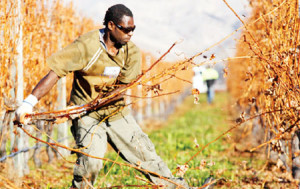For the last six years, officials from 14 member countries of the Pacific Islands Forum have been negotiating with Australia and New Zealand to set up a free trade agreement, known as PACER-Plus. The Pacific’s Chief Trade Adviser on PACER-Plus is Ghanian-born Australian, Dr Edwini Kessie, who tells Business Advantage PNG that labour mobility and the future of development assistance are two key stumbling blocks.

Pacific Trade Adviser, Ed Kessie
Business Advantage PNG (BAPNG): Why is the PACER Plus agreement important for Pacific Island Countries?
Ed Kessie (EK): As a trade and development agreement, PACER-Plus will facilitate the greater participation of Pacific Island Countries (PICs) in international trade.
The share of PICs in world trade is estimated to be around 0.05 per cent.
If they were to increase it 0.5 per cent, this would represent an additional income of more than US$50 billion per year, an amount far greater than the total aid received from donor countries and organisations.
So PACER Plus will provide a platform for the PICs to attract foreign direct investment into the critical sectors of their economies, and increase and diversify their exports to Australia and New Zealand, as well as to each other.
BAPNG: What sectors of Pacific economies do the talks cover?
EK: PACER-Plus will result in a comprehensive trade agreement covering trade in goods, trade in services, investment, regional labour mobility and development assistance.
It will therefore cover most sectors of Pacific Island economies.
BAPNG: New Zealand and Australia have been unwilling to include opportunities for seasonal workers. Fiji’s former trade negotiator says NZ and Australia need to soften their stance. Will the agreement see more labour mobility between Pacific nations and Australia/New Zealand?
EK: In principle, PACER-Plus should result in increased labour mobility between Pacific Island Countries, Australia and New Zealand.
A key objective of the Labour Mobility Chapter [in the agreement], which covers largely unskilled occupations in the horticulture and viticulture sectors, is to enhance the operation of NZ’s Recognised Seasonal Employer and Australia’s Seasonal Worker Program.

Labour mobility a key issue. Credit: Samoa Observer
The Chapters on Trade in Services and the Temporary Movement of Natural Persons should result in greater labour mobility in the semi-skilled and skilled occupational areas among PACER-Plus parties.
BAPNG: The basic idea is that the agreement will eliminate tariffs, but Pacific economies rely on tariffs for income. How will Pacific governments make up the shortfall in revenue?
EK: The degree of dependence on tariff revenue varies widely among Pacific Island Countries.
Some of the countries have carried out tax reforms and consequently rely very little on Customs revenue to raise funds for the Government.
In any event, PACER-Plus will not require countries to eliminate all their tariffs on goods originating from partner countries.
Furthermore, countries will be given longer transitional periods to implement their tariff reductions.
Any potential losses are likely to be offset by gains from, inter alia, enhanced labour mobility in both skilled and unskilled occupations, development and economic cooperation, trade in services and investment.
PACER Plus will provide a platform for the PICs to achieve rapid economic growth and sustainable development, which would help in job creation and enhanced living standards for the Pacific people.
BAPNG: When is an agreement likely?
EK: We are aiming to finish the negotiations on the legal text by September [2015] and the overall negotiations by the end of next year [2016].








Speak Your Mind